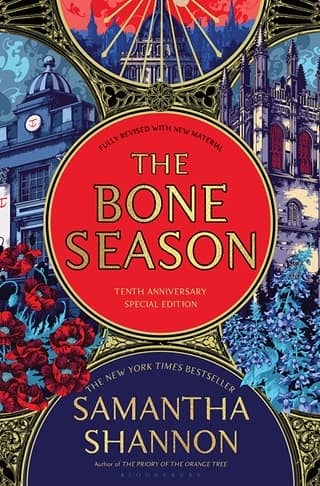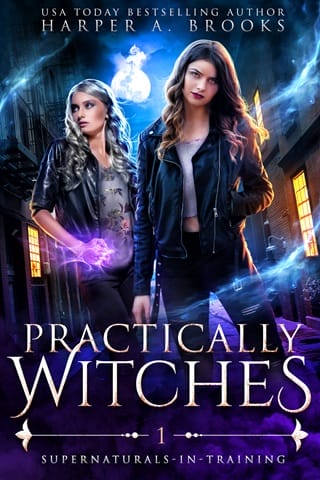Glossary
Glossary
Æther [noun]: The spirit realm, which exists alongside the physical or corporeal world, Earth. Among humans, only clairvoyants can sense the æther.
Adamant: [noun] A metal from the Netherworld.
Amaranth: [noun] An iridescent flower that grows in the Netherworld. Its nectar can heal or calm any wound inflicted by a spirit; it can also fortify the dreamscape.
Amaurotic [noun or adjective]: A human who is not clairvoyant. This state is known as amaurosis, from an Ancient Greek word referring to a dimming or dulling, especially of the senses. Among voyants, they are known colloquially as rotties.
Anchorite: [noun or adjective] A disparaging term for people who work directly for Scion, or are especially committed to its message. It can also be used as a descriptor, e.g. anchorite propaganda.
Angel [noun]: A category of drifter. There are several known sub-types of angels:
— A guardian angel is the spirit of a person who died to protect someone else, and now remains with the living person they saved
— An archangel protects a single bloodline for several generations
— A fallen angel is a spirit compelled to remain with their murderer.
All sub-types of angels can be breachers.
Apport [noun]: The movement of physical objects by ethereal means, derived from Latin apportō (‘I bring, I carry’). Among spirits, this ability is unique to breachers. Rarely, clairvoyants or Rephaim may be able to use apport.
Aster: [noun] A genus of flower. Certain kinds of aster have ethereal properties:
— Blue strengthens the link between the spirit and the dreamscape. It can sharpen recent memories and produce a feeling of wellbeing
— Pink strengthens the link between the spirit and the body; consequently, it is often used by voyants as an aphrodisiac
— Purple, highly addictive, is a deliriant that distorts the dreamscape
— White causes amnesia
Aura: [noun] A manifestation of the link between a clairvoyant and the æther, visible only with the sight. Since the Netherworld began to deteriorate, Rephaim have required human auras to sustain their own connections to the æther.
Biblioclasm: [noun] A book burning.
Binder: [noun] A type of clairvoyant who can compel and tether spirits. A spirit that serves a binder is called a boundling.
Bob: [noun] Slang term for a pound. The Scion Inquisitorial Pound is the official currency of the Republic of Scion, used across all nine countries.
Bob cab: [noun] An unlicensed cab, generally used by clairvoyants.
Bone: [adjective] Good or prosperous, from thieves’ cant; originally from French bonne.
Bone-grubber: [noun] A derogatory term for a red-jacket. The term refers to individuals who collect and sell unwanted items, such as rags and bones.
Boundling: [noun] A spirit controlled by a binder.
Breacher: [noun] A category of spirit that can affect the corporeal world, e.g. by injuring the living or moving objects. The ability to breach is usually related to the manner of a spirit’s death – a violent death is more likely to produce a breacher. The most common types of breacher are angels and poltergeists. When breachers touch either a human or a Rephaite, they can leave cold scars and a profound chill.
Broadsider: [noun] An archaic term for a cartomancer.
Brogue: [noun] A hibernophobic slur in the Republic of Scion, referring to an Irish accent.
Busking: [noun] Plying a skill for money in public. For clairvoyants, this is a type of mime-crime.
Buzzers [noun]: See Emim.
Cartomancer: [noun] A clairvoyant who uses cards to connect with the æther.
Clairvoyant: [noun] A human who can sense and interact with the spirit world, the æther. They are identifiable by their aura.
Cohort: [noun] An administrative division in the Scion Citadel of London. The citadel is divided into six large cohorts, each of which is internally divided into six sections. I Cohort is the centre; the other six cohorts extend in concentric circles around it, with VI Cohort forming the outermost edge of the citadel.
Cold spot: [noun] A portal between Earth and the Netherworld, which manifests as a perfect circle of ice. Humans cannot pass through a cold spot, but Rephaim and Emim can.
Courtier: [noun] A habitual user of purple aster. The name comes from Mayfield Lane in Soho, formerly known as St Anne’s Court, where the aster trade began.
Dacrodiorin: [noun] An expensive medicine, created by the Republic of Scion, which significantly accelerates healing.
Data pad: [noun] A tablet computer, widely used in the Republic of Scion.
Denizen: [noun] A resident of the Republic of Scion.
Dethroned: [adjective] A slang term among courtiers, referring to complete recovery from the influence of purple aster. The opposite is to be reigning.
Dreamscape: [noun] The house or seat of the spirit, where memory is stored. The term is often used interchangeably with mind by clairvoyants.
The dreamscape is thought to be how the brain manifests in the æther, and often resembles a place where an individual feels safe. Clairvoyants can access their dreamscapes at will, while amaurotics may catch glimpses in their sleep. The dreamscape is split into five zones or rings:
— Sunlit zone, the centre of the dreamscape, where the spirit is supposed to dwell. The silver cord fastens it in place
— Twilight zone, a darker ring that surrounds the sunlit zone. The spirit may stray here in times of mental distress. Only dreamwalkers can go beyond this zone without injuring themselves
— Midnight and abyssal, the next two zones
— Hadal zone, the outermost and darkest ring of the dreamscape. Beyond this point is the æther. There may be spectres – manifestations of memory – in this zone
Dreamwalker: A contraction of dreamscape walker, referring to an exceptionally rare and complex form of clairvoyance. Comparable to the concept of astral projection, dreamwalking involves the dislocation and projection of the spirit from the dreamscape. Dreamwalkers have an unusually flexible silver cord, allowing them to not only walk anywhere in their own dreamscape, but possess other people.
Drifters: [noun] Spirits that have not gone to the outer darkness or the last light, instead remaining within reach of the living. They are broadly divided into two categories: breachers and common drifters. Within these categories are numerous sub-types of spirit, including angels and ghosts.
Ectoplasm: [noun] The Rephaite equivalent of blood. It is luminous and slightly gelatinous, and considered to be molten æther. As such, it heightens clairvoyant abilities.
Emim: [noun] Large and violent creatures that have infested the Netherworld and are now venturing to Earth. They are known colloquially as Buzzers, due to a distinctive sound that voyants hear when they appear. They feed on human flesh to sustain their earthly forms, and are also believed to devour spirits.
Ethereal: [adjective] Pertaining to the æther.
Finewiring: [verb] A slang term for skilful pickpocketing.
Fell tongue: [noun] A collective term for all human languages, used by the Rephaim to distinguish them from Glossolalia, the ethereal tongue.
Flam: [noun] A slang term for a lie, used exclusively in the underworld of London.
Flash house: [noun] Formerly a term for a brothel, it now refers to any entertainment venue where clairvoyants gather to socialise, particularly nightclubs. They are often owned by clairvoyants and pay syndicate tax, but may be frequented by both voyants and amaurotics.
Floxy: [noun] A brand name for scented and enriched oxygen, inhaled through a cannula. Served in most entertainment venues across the Republic of Scion, including dedicated oxygen bars. It is considered a legal alternative to alcohol and recreational drugs, both of which are forbidden under Inquisitorial law.
Flux: [noun] A colloquial name for Fluxion 14, a deliriant that has a particularly intense effect on clairvoyants. One of the key ingredients is purple aster. The number refers to the version of the drug.
Ghost: [noun] A spirit that prefers to dwell in one place – often their place of birth or death. Moving a ghost from its haunt will upset it.
Gilet: [noun] A sleeveless jacket.
Glossolalia: [noun] The language of spirits and Rephaim, distinguished from the fell tongue. Usually shortened to Gloss. It is impossible to acquire Gloss; one can only be born with it. Among humans, only polyglots are capable of speaking it.
Glow: [noun] A clairvoyants’ slang term for aura.
Golden cord: [noun] A connection between two spirits. It creates a seventh sense, allowing the linked individuals to track one another and share their emotions.
Grand Inquisitor [noun]: Leader of a Scion country. Each has its own Grand Inquisitor, but they all submit to the authority of the Grand Inquisitor of England, currently Frank Weaver.
Grand Raconteur [noun]: The main propagandist of a Scion country, who makes public announcements and reads the news. News reporters are known as little raconteurs.
Greasepaint: [noun] A slang term for makeup.
Haunt: [noun] A place occupied by a spirit – typically a ghost – for a long time.
Harlie: A derogatory term for a performer, derived from harlequin.
Inquisitorial [adjective]: Referring to the authority of a Grand Inquisitor, e.g. Inquisitorial law.
Jarker: [noun] A forger of documents in the underworld, employed to provide fake travel papers and identity cards, and to send clandestine messages across Scion. Some jarkers also specialise in making counterfeit money. They may be clairvoyant or amaurotic.
Kern [noun]: A derogatory term for Irish defectors to the Republic of Scion, from Old Irish ceithern, referring to Irish or Scottish soldiers.
Last light: The end or heart of the æther, the place from which spirits can never return. What lies beyond it is unknown.
Ley lines: [noun] A term for the trade routes between the various underworlds of the Republic of Scion.
Macer: [noun] A slang term for a cheat.
Mecks: A non-alcoholic drink. Comes in white, rose and blood (red) to imitate wine.
Mime-crime: [noun] Any act involving contact with the spirit world, especially for financial gain.
Mime-lord or mime-queen: [noun] A high-ranking member of the clairvoyant syndicate of London. Generally heads a dominant gang of five to ten followers, but maintains overall command over clairvoyants within a section of the citadel. Together, the mimequeens and mime-lords of London form the Unnatural Assembly.
Mollisher: [noun] The heir and second-in-command of a mime-lord or mime-queen.
Netherworld: [noun] The home world of the Rephaim, which once functioned as an intermediary realm between the æther and Earth. At some point, the Netherworld was overrun by the Emim and began to fall into decay, forcing the Rephaim to relocate to Earth.
Nose: [noun] A spy or informant.
Numa: [noun] [singular: numen] Objects used by soothsayers and augurs to connect with the æther, e.g. mirrors, tarot cards and bones. The term originates from the seventeenth century and refers to a divine presence or will.
Off the cot: [adjective] A slang term for mad.
Oracle: [noun] One of the two categories of jumper. Oracles receive sporadic visions of the future from the æther, often experiencing intense migraines at the same time. They can also learn to make and project their own visions. Like dreamwalkers, they have red auras.
Ossista: [noun] A waitron in an oxygen bar.
Outer darkness: [noun] A distant part of the æther that lies beyond the reach of clairvoyants. Spirits sent to the outer darkness are rendered incommunicado, but may be able to return through sheer force of will. See also threnody.
Paddy wagon: [noun] A slang term for a vehicle used to transport prisoners.
Penny dreadful: [noun] Cheap, illegal fiction produced in Grub Street, the heart of the clairvoyant writing scene. They are often serialised horror stories.
Performer: A human who has either been evicted from the residences or received the yellow streak. Performers specialise in various arts to entertain the red-jackets, and are under the command of the Overseer. Also known as harlies.
Phantasmagoria: [noun] A colloquial name for the delirium induced by flux, referring to the vivid hallucinations it causes.
Pink-jacket: [noun] The second rank for humans in Oxford. Pink-jackets have passed their first test by verifying their gift.
Querent: [noun] A person who seeks knowledge of the æther. They may ask questions or offer part of themselves, e.g. their palm, for a reading.
Red-jacket: [noun] The highest rank for humans in Oxford. Red-jackets are primarily responsible for patrolling Gallows Wood to protect the city from the Emim. Also called bone-grubbers.
Reef: [verb] To hit; to strike.
Regal: [noun] Purple aster.
Reigning: [verb] Using purple aster.
Rephaim: [noun] [singular: Rephaite] Humanoid beings of the Netherworld. Among humans, they are known colloquially as Rephs. Since their proper Glossolalic name is untranslatable in the fell tongue, Lord Palmerston named the arrivals after the eponymous Biblical giants, referencing their imposing stature.1 Since their world fell into decay, the Rephaim have been forced to use human aura to sustain themselves.
Rookery: [noun] A Victorian slang term for a slum. In Oxford, it refers to a shantytown on the Broad, where the performers live.
Rottie: See amaurotic.
Sarx: [noun] The skin of Netherworld beings. Rephaite sarx is slightly metallic and more durable than human skin, showing no signs of age. While Earth-made weapons may pierce it, it will heal quickly, while breachers and Netherworld metals cause significantly more damage.
Sasanach: [noun] An Irish word for an English person, literally meaning Saxon.
Scionet: [noun] The intranet of the Republic of Scion.
Scimorphine: [noun] The most effective painkiller in Scion.
Scrying: [noun] The art of seeing into and gaining insight from the æther, especially through numa.
Shade: [noun] A type of drifter, older than a wisp.
Sheol I: [noun] The code name given to Oxford under the rule of the Rephaim. It was agreed that each of their earthly abodes would be named after a human conceptualisation of the afterlife in honour of the Netherworld: Sheol (Biblical) for cities in Scion West, Tuonela (Finnish) for those in Scion North, Erebus (Greek) for those in Scion East, and Orcus (Roman) for those in the proposed Scion South.
Shew stone: [noun] A type of numen used by seers. Like a crystal ball, a shew stone can offer glimpses of the future.
Silver cord: [noun] The link between the body and the spirit. The silver cord wears down over the years and eventually snaps, resulting in death.
Skilly: [noun] A thin gruel, made of meat juices or oats.
Soothsayers: [noun] One of the seven orders of clairvoyance according to On the Merits of Unnaturalness. Broadly agreed to be the most populous order, soothsayers are reliant on numa to connect with the æther.
Spirit sight: [noun] Sometimes referred to as the third eye or simply as the sight. The ability to perceive the æther visually, indicated by one or both pupils being shaped like a keyhole. Most voyants are sighted, but some are not. Half-sighted voyants can choose when to see the æther, while full-sighted voyants must see it all the time.
Spool: [1] [noun] A group of spirits; [2] [verb] to draw spirits together. All clairvoyants are capable of spooling.
Strides: [noun] A slang term for trousers.
Syndicate tax: [noun] A monthly sum of money paid by London clairvoyants to their local mime-lord or mime-queen, to buy a place on their turf.
Syndies: [noun] Members of the clairvoyant syndicate of London.
Threnody: [noun] A series of words used to banish spirits to the outer darkness. There are many threnodies, developed by clairvoyant communities across the world.
Toke: [noun] A slang term of uncertain origin, referring to low-quality bread.
Underlord or Underqueen: [noun] The head of the Unnatural Assembly and mob boss of the clairvoyant syndicate of London. The incumbent Underlord is Haymarket Hector.
Unnatural: [adjective or noun] The formal name for clairvoyants under Inquisitorial law.
Veil: [noun] A word used to describe the boundaries between the three known planes of being – the corporeal world, the æther, and the Netherworld.
Vigile: [noun] A member of the police forces of Scion. Day Vigiles are amaurotic and work for the Sunlight Vigilance Division (SVD), while night Vigiles are clairvoyant and work for the Night Vigilance Division (NVD). Night Vigiles agree to be euthanised after thirty years of service.
Voyant: [noun] A common shorthand for clairvoyant.
Waitron: [noun] A gender-neutral term for anyone in the service industry of the Republic of Scion.
White-jacket: [noun] The preliminary rank for humans in Oxford. A white-jacket is expected to take a test to demonstrate their proficiency in clairvoyance and their loyalty to the system; upon passing it, they become a pink-jacket.
Windflower: [noun] A red flower, also known as the poppy anemone. In Greek myth, it grew from the blood of the hunter Adonis, a lover of Aphrodite. Though named for its short-lived fragility, its pollen can inflict serious damage on Rephaim.
Wisp: [noun] The weakest type of drifter. Wisps are often used in spools to bolster their strength.
Yellow-jacket: [noun] A rank given to humans in Oxford if they show defiance or cowardice. Earning a yellow tunic three times is called the yellow streak and usually results in permanent eviction to the Rookery.
1The word may also refer to ancient demigods or kings, or the shades of the dead who dwell in Sheol. Several alternative names were proposed, including Titans, Manes and Ettins.
 Fullepub
Fullepub 



